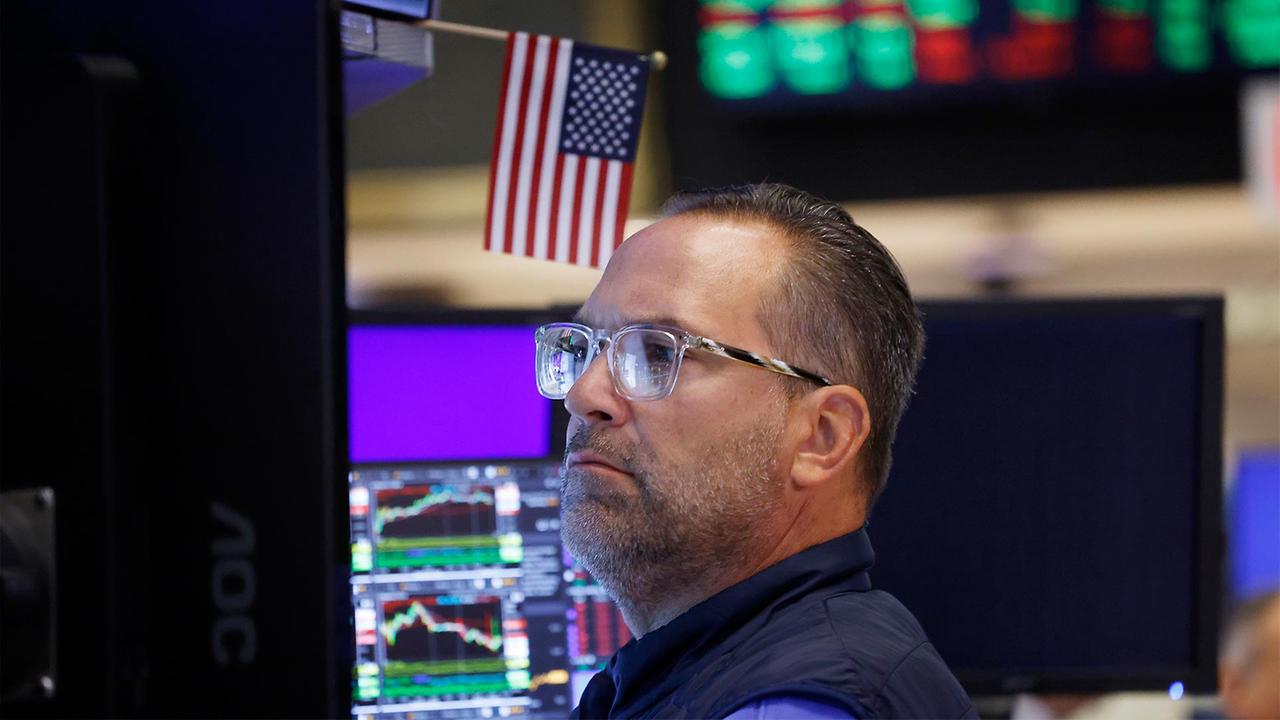market report
Investors on the US stock exchanges are currently not taking any major risks given the flood of balance sheets. The DAX was unable to maintain its initial gains after strong SAP figures.
As the accounting season gets underway, investors on Wall Street are cautious. However, the US stock markets were largely able to shake off initial slight losses. Declining interest rate optimism continued to weigh somewhat on sentiment. The US leading index Dow Jones remained almost unchanged at 42,925 points and the broad S&P 500 also closed little changed at 5,851 points. Both stock market barometers reached record highs last week. The Nasdaq technology exchange index was listed about 0.1 percent higher.
Investors tried to interpret incoming financial reports from several large companies. “Earnings season will provide useful information on the US economy, consumer spending, the slowdown in global economic growth and the profits of lesser-known companies,” wrote experts at analyst firm BCA. They were optimistic: US companies' profits and forecasts for the third quarter should therefore be strong enough to support investors' hopes of a “soft landing” for the US economy.
In addition, monetary policy remains an issue on the stock market. Investors scaled back their interest rate expectations after members of the US Federal Reserve indicated that they would prefer a slower pace of interest rate cuts, trading sources said. In addition, the inflationary impact of a possible victory by Donald Trump in the US presidential election in two weeks was weighing on markets, as his promised tax cuts and trade tariffs could ultimately lead to higher interest rates.
Meanwhile, after a solid start, the DAX fell back below its previous day's level today and closed with losses, as it did at the beginning of the week. Today the drop was 0.2 percent, meaning the stock market barometer is now at 19,422 points. Convincing business figures from SAP prevented anything worse from happening.
“The DAX is a good 900 points higher today than it would be without the shares of what is now Europe's largest technology company,” said chief analyst Jochen Stanzl from broker CMC Markets in the afternoon. The shares of Europe's largest software manufacturer temporarily climbed to a record high and gained almost six percent at their peak; most recently the increase was 1.3 percent.
Last Thursday, the leading German index reached a record high of around 19,675 points. Market expert Andreas Lipkow referred to profit-taking, which has now overshadowed the recent positive mood among investors. “The reporting season that has just begun will not be a free ride and is also partly marked by weaker quarterly reports.” In the DAX, for example, the reinsurer Munich Re was disappointing with its preliminary figures.
The company reports will remain in focus in the coming days. “The consolidated balance sheets will be a very important factor in the future direction of the stock market, as they will show whether the current price levels are justified or not,” emphasized Chris Scicluna, chief analyst at broker Daiwa Capital Markets. As the week progresses, the financial reports of a total of 114 companies from the S&P 500 are due in the USA – including IBM, Tesla and Coca-Cola.
The chart technicians at HSBC consider the current DAX weakness to be a “healthy consolidation”. ING expert Christian Zoller, who also argues in terms of chart technology, looks more downward: In his opinion, a break below the support at 19,500 or 19,400 points would generate a signal of weakness. “The target would then initially be 19,000 points,” said Zoller.
The euro's exchange rate remained somewhat under pressure in US trade. The common currency was last traded at $1.0801. This is the lowest level since the beginning of August. In early European trading it was quoted a little higher.
Prices on the oil market reduced their initial losses. The North Sea crude oil type Brent and the US type WTI rose in price by 2.5 percent each to 76.19 and 72.54 dollars per barrel (159 liters). The US's new attempt at mediation in the Middle East had pushed prices down by up to around one percent earlier in the day. “Crude oil prices are changing in response to the mixed news from the Middle East – depending on how the situation oscillates between escalation and de-escalation,” commented Satoru Yoshida, commodities analyst at financial services provider Rakuten.
After a surprisingly good quarter, Europe's largest software manufacturer SAP is setting higher goals for the year as a whole. Despite the tense economic situation, CEO Christian Klein is making more plans for both sales and operating profits. With the ongoing major restructuring of its workforce, SAP is not making as quick progress with the planned new hires as expected. Because SAP is cutting thousands of jobs at the same time, this benefited the result. As did the comparatively lucrative software licensing business, which shrank less than expected.
The chemical company BASF wants to rely more on alternative raw materials in production. “It can be anything, even frying fat or liquid manure, but above all it is substances like biogas or bionaphtha,” said CEO Markus Kamieth to Manager Magazin. The need for green raw materials will increase sharply in the coming years, said Kamieth. “Because all industries have to decarbonize. We are already buying it today, but we may also invest in biorefineries.”
The financial investor Carlyle is throwing in the towel on the Thyssenkrupp shipyard subsidiary TKMS. “We can confirm that the investment company Carlyle Group has informed us that it is withdrawing from the bidding process for a stake in Thyssenkrupp's marine division,” Thyssenkrupp told the Reuters news agency upon request. Thyssenkrupp is still sticking to its plans for the subsidiary to become independent. “To this end, we will now intensively pursue the parallel path we have taken to make the marine segment independent on the capital market,” it said. Carlyle declined to comment.
The US telecommunications company Verizon was able to win more new customers than expected in the third quarter. With a net increase of 239,000 new contract customers, the competitor of the Deutsche Telekom subsidiary T-Mobile US convinced more people than analysts had expected on average. The number of radio-based Internet connections (fixed wireless) rose by 363,000 to almost 4.2 million customers, as Verizon announced. According to its own information, the AT&T competitor has achieved its goal around 15 months earlier than planned.
The conglomerate 3M is once again becoming more confident about the current year. The company in St. Paul announced that adjusted earnings from continuing operations should be $7.20 to $7.30 per share. This means that 3M raised the lower end of the range by 20 cents for the second time since new CEO William Brown has headed the group. Adjusted sales are now expected to increase by one percent compared to the previous year. The company had previously targeted both a decline of up to 0.25 percent and an increase of up to 1.75 percent.
The Lower Saxony steel group Salzgitter is lowering its annual forecast due to the ongoing period of weakness in important target markets. The operating result (Ebitda) will be 275 to 325 million euros instead of the previously expected 400 to 500 million euros, Salzgitter announced. Sales will be in the range between 9.5 and 10.0 billion euros. The group had previously targeted around ten billion.
The hurricanes “Helene” and “Milton” do not throw Munich Re off course. The world's largest reinsurer is now targeting a net profit of more than five billion euros in 2024. “Based on the very good net result after nine months of 4.7 billion euros, Munich Re now expects to exceed its 2024 earnings target of five billion euros, despite the expected significant loss burden from Hurricane Milton,” the group said. In the third quarter, Munich Re generated a profit of around 900 million euros. That's half a billion less than analysts had expected.
After poor prospects for the coming year, the Dutch chip system manufacturer ASML expects 2026 to be a year of growth. However, it is still too early to predict the extent, said ASML boss Christophe Fouquet at a conference in London. The export restrictions to China are an obstacle and will certainly remain in place, regardless of who wins the presidential election. “When you look at the geopolitical landscape, I think it's clear that the US will continue to apply pressure on its side to impose further restrictions.”
The US car manufacturer General Motors earns more than expected. In the third quarter, sales increased to $48.8 billion, a good ten percent more than a year ago and significantly more than analysts surveyed by Refinitiv had expected. Ford's arch-rival earned $2.96 per share, a good 50 cents more than forecast. GM Chief Financial Officer Paul Jacobsen said demand for the vehicles was good. Interest rate cuts are likely to further boost customers' purchasing mood in the coming year.
According to a media report, the ailing auto supplier ZF Friedrichshafen no longer wants to participate in the US company Wolfspeed's planned chip factory in Saarland. ZF no longer wants to contribute the 170 million euros it promised at the beginning of last year, Handelsblatt reported with reference to government and industry circles. That is why the already postponed project to build a chip factory with state funding for a total of 2.75 billion euros is about to come to an end. Meanwhile, the Saarland state government emphasizes that it stands by all commitments for the construction – but also wants to be prepared for alternatives.
The major British bank HSBC wants to reorganize various business areas and regions. “The new structure will lead to a simpler, more dynamic and more agile organization,” said HSBC boss Elhedery. The new CEO is also making extensive cost cuts. Among other things, the number of managers in the newly named “Key Operating Committee” is to be reduced from 18 to 12. This will see the first female finance chief in the bank's 159-year history take over: Pam Kaur will take over the department at the beginning of 2025.
Deutsche Telekom wants to discontinue the outdated GSM (2G) mobile communications network by summer 2028. It is expected that 2G mobile communications will be switched off completely by June 30, 2028. Mobile phone calls from Deutsche Telekom will then only be possible in the 4G (LTE) and 5G networks. Owners of old 2G cell phones are particularly affected by the technical change. From summer 2028, you will no longer be able to make calls on the Telekom network with these devices and will have to switch to either a smartphone or an LTE-capable basic cell phone.
…




